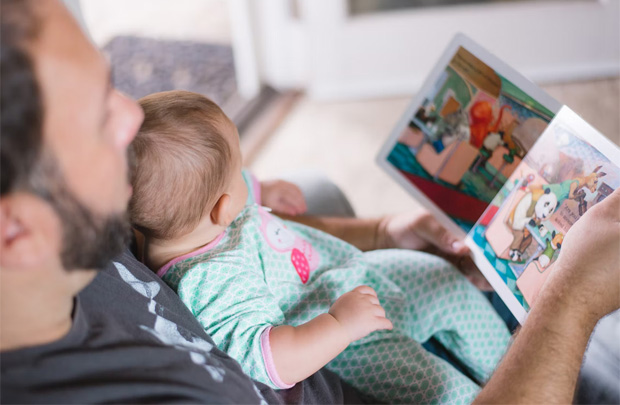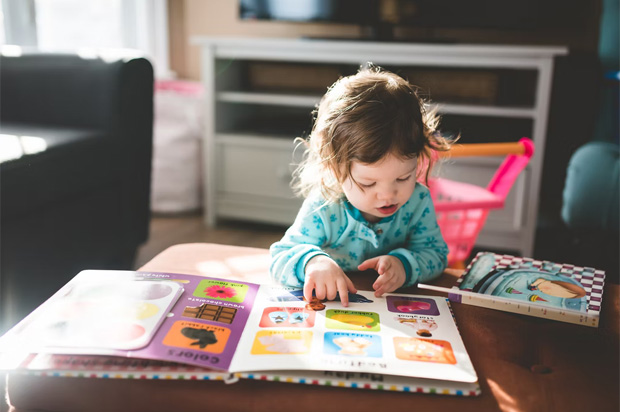5 Ways to Teach Your Child to Read

5 Ways to Teach Your Child to Read
All parents dream of their kid’s happiness. They want the kids not only to have a good, joyful life but also understand themselves and the world, gain knowledge and use it skillfully. In other words, they dream that in the stormy ocean of the modern world, their kid’s ship will always move confidently in the right direction. Both moms and dads put so much effort into teaching kids to steer these ships. And the ability to read is one of the surprisingly essential stages of this learning. How to teach a kid to read? Where to start? How do you develop decoding skills, and teach sight words, literacy, phonics, and other simple things? The main thing is that you need to engage with your kid regularly. There are many ways to teach children to read, but we have selected just five helpful tips.

1. Read Aloud to the Baby
Learning to read is a process that begins in early childhood, and it’s a key to success. We don’t promote programs that teach your kid to read using cards! We encourage you to start reading with your baby a few days after birth. So the baby hears new words, perceives new information, and widens vocabulary. It’s a particular time of your unity and an opportunity to instill a love for books in your kid. At the same time, the pleasure of such reading is the only guarantee of successful school lessons in the future. And if babies don’t learn to enjoy reading from an early age, it is likely to interfere with their abilities in the future.
How much should you read to your baby? You decide. However, try to read at least one short story a day, even if the kid is still very young, it’s not a lot. When she grows up and can concentrate longer, try reading with her for at least 20 minutes every day.

2. Ask Questions
While you are reading, be sure to make contact with your baby from time to time. “The questions asked during the reading encourage the kid to interact with the book and develop the ability to understand what is read” claims Maria Juarez – a receptive skills development expert, who writes for papersowl.com to share her professional opinions. The fact is, that when the primary purpose of reading for you is the kid’s ability to “reproduce” words, then you completely lose the essence. After all, even a baby who can read fluently may still not have reading comprehension and understanding of every word.
If the child can not understand what she or he is reading, then reading does not make sense. While reading, show pictures and ask your baby to try to predict the development of events, ask why the character made such a choice, what he thought the book’s characters felt, etc. It is perfect if the characters of the book are depicted with strong emotions. Then, by communicating about the characters’ feelings, you can simultaneously develop emotional intelligence, appealing to the kid’s personal experience. After reading the book, ask if the predictions about the finale have come true. And then – what the kid remembered from reading.
3. Be a Good Example – Read for Yourself
Even if young children become interested in books early, they can quickly lose interest when they do not have a role model. If you are not an avid reader, make sure your child sees you reading for a few minutes every day! Read a magazine, a cookbook, a novel, a text – it doesn’t matter what – the choice is yours! But show your baby that reading is something even adults should do. As parents, we sometimes worry too much about making our kids succeed in the future. But we often forget that babies often learn from our example. This way kids won’t feel single and will be taught that starting to read makes a person smart. So, you and your kid will become readers together.

4. Find and Name the Letters Around
From a certain age, we usually start teaching babies the letters of their names. Okay, not just teach, but make them learn the alphabet. We buy cards or install various applications on gadgets that promise to teach our kids letters. We drill two-year-old daughters and sons repeatedly, trusting the advertising slogans. Please don’t buy into it. The human mind is like a sponge and can memorize anything, including the alphabet if you drill it. But this is by no means the most effective method.
Allow your kid to be a kid, and yourself – take advantage of favorable learning situations! The best way is to find letters in the name that they see every day – for example, inscriptions on their bed, posters with words on the wall, rugs with letters, dishes with their names, or food in the form of words – they will wake them up. Encourage interest and curiosity. This is an excellent opportunity to develop a practical skill that has real meaning and weight for the baby. In addition, never neglect the chance to use the so-called environmental labels, which are all the labels around us: signs in public places, brands, road signs, and more. You don’t need to buy the special program, you could just walk around the city, play, and look for specific characters’ letters, even at home you can do such a game.
5. Activate Different Areas of Development
Children learn better when different areas of the senses or so-called regions of development are activated. That’s why hands-on learning helps you remember and focus better. If your baby is interested in letters and you have already started using the fourth tip to recognize these letters, begin implementing activities that integrate as many senses as possible. Remember that learning the names of letters is not as important as knowing the sounds! Of course, you can’t expect knowledge of phonemic awareness and every sound, but reading skills will be improved.

Conclusion
These tips are general and beneficial for babies of any age, regardless of whether your baby is ready to read. Be patient. Do not use all the techniques together, and do not expect your kid to succeed at once. You need to have fun while reading and continue helping your kid.
Remember that your ultimate goal is to raise a baby, not a person who will memorize everything thoughtlessly, but a person who will learn throughout life and loves to read.
Author: Bertha Graham.





